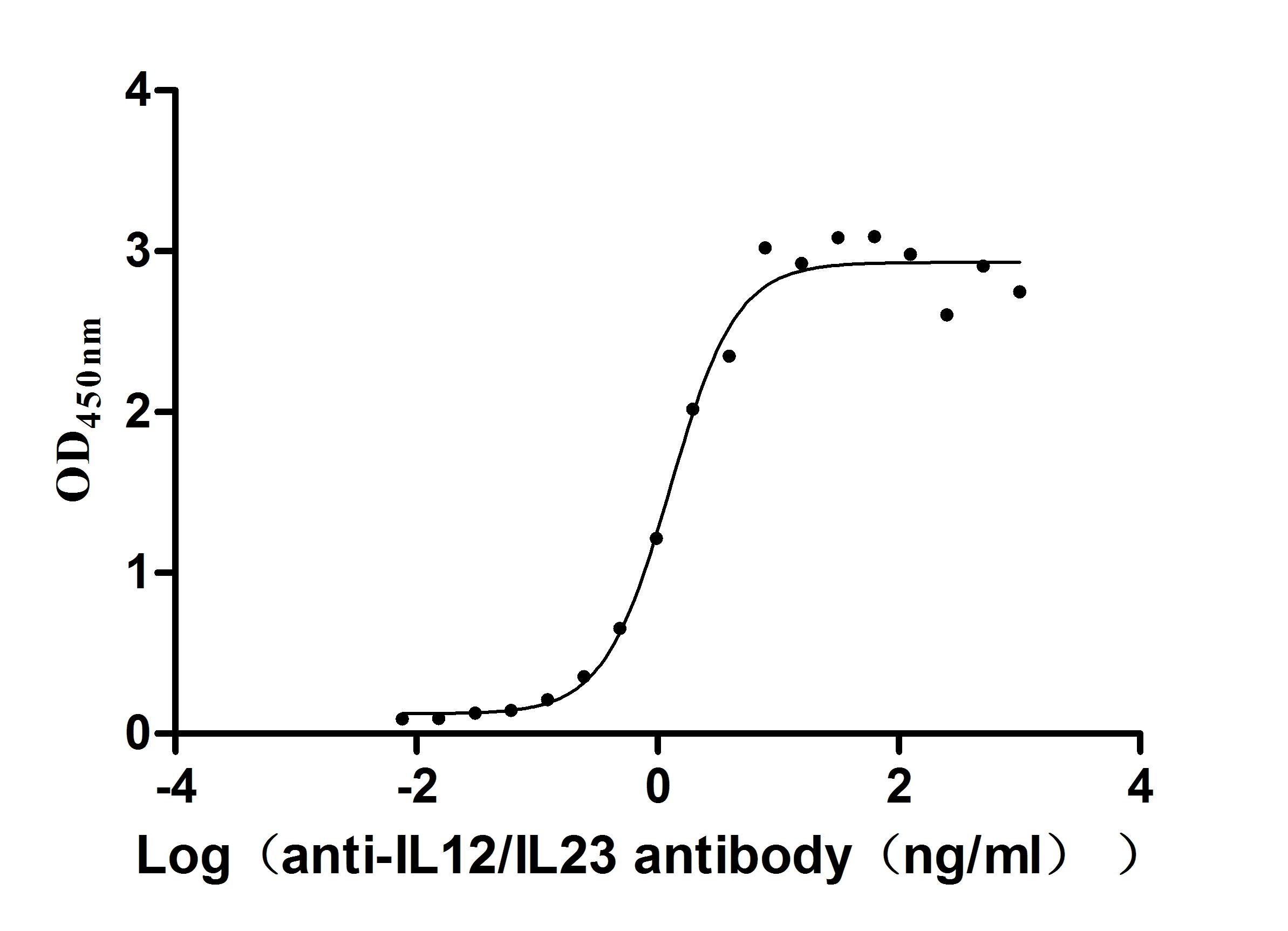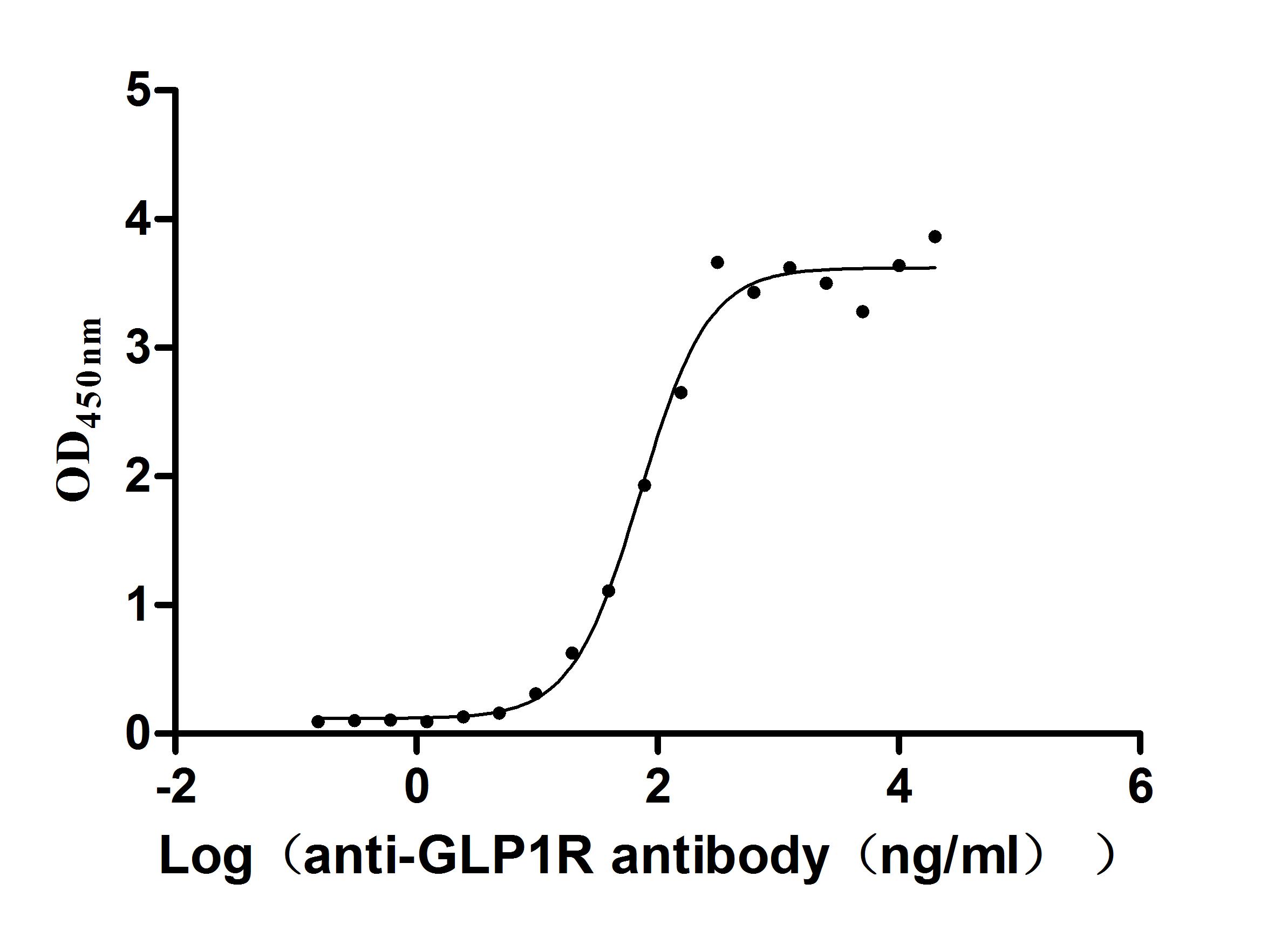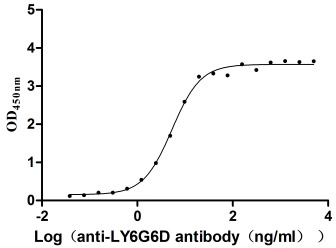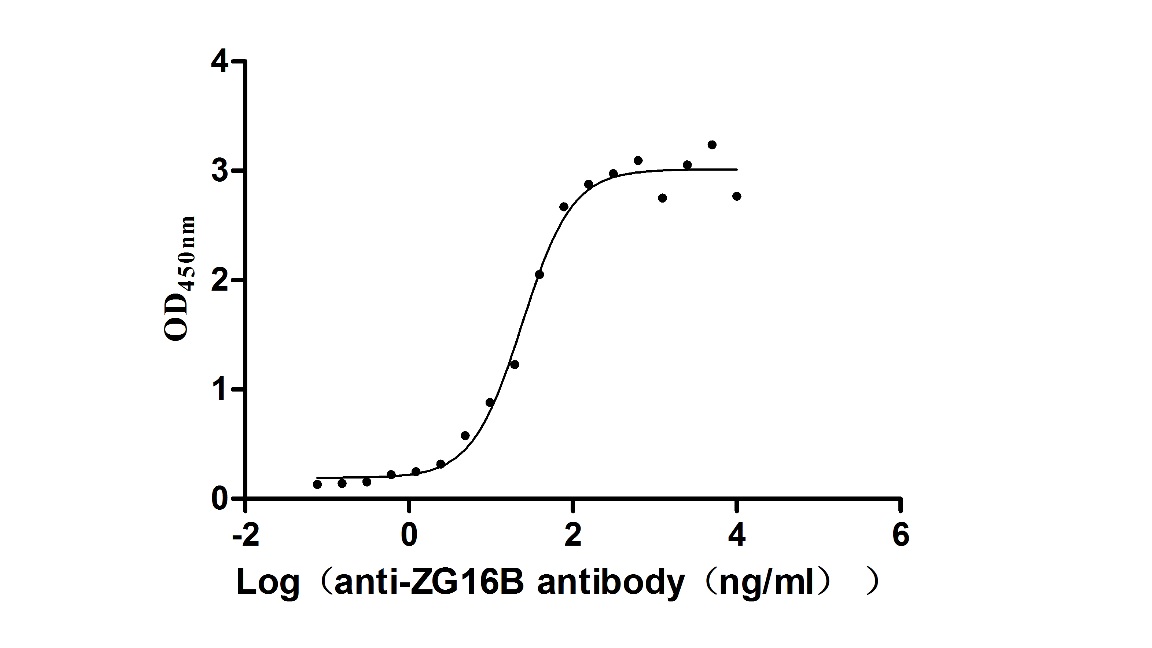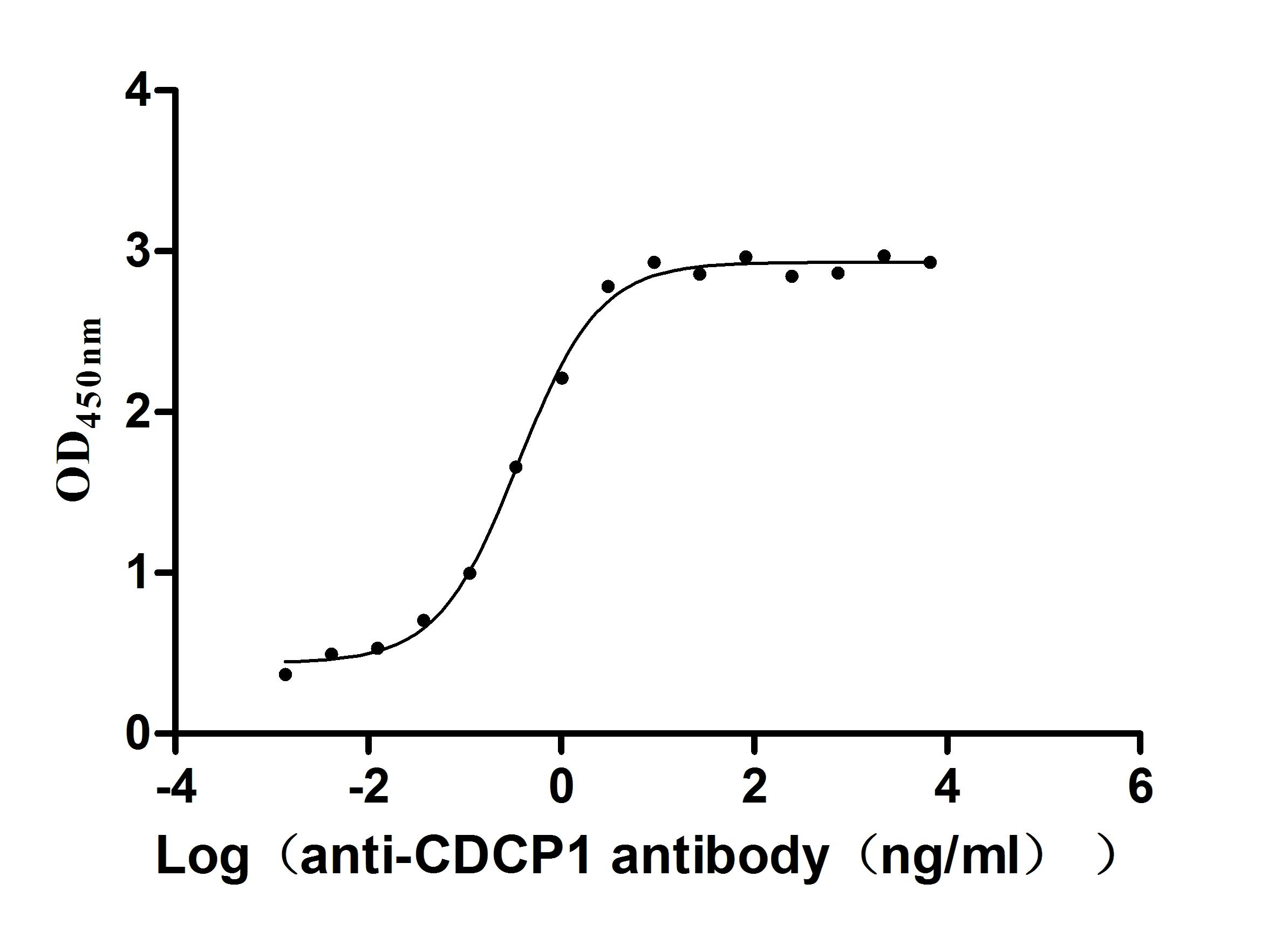Recombinant Human Solute carrier family 26 member 6 (SLC26A6), partial
-
中文名称:人SLC26A6重组蛋白
-
货号:CSB-YP861164HU
-
规格:
-
来源:Yeast
-
其他:
-
中文名称:人SLC26A6重组蛋白
-
货号:CSB-EP861164HU
-
规格:
-
来源:E.coli
-
其他:
-
中文名称:人SLC26A6重组蛋白
-
货号:CSB-EP861164HU-B
-
规格:
-
来源:E.coli
-
共轭:Avi-tag Biotinylated
E. coli biotin ligase (BirA) is highly specific in covalently attaching biotin to the 15 amino acid AviTag peptide. This recombinant protein was biotinylated in vivo by AviTag-BirA technology, which method is BriA catalyzes amide linkage between the biotin and the specific lysine of the AviTag.
-
其他:
-
中文名称:人SLC26A6重组蛋白
-
货号:CSB-BP861164HU
-
规格:
-
来源:Baculovirus
-
其他:
-
中文名称:人SLC26A6重组蛋白
-
货号:CSB-MP861164HU
-
规格:
-
来源:Mammalian cell
-
其他:
产品详情
-
纯度:>85% (SDS-PAGE)
-
基因名:SLC26A6
-
Uniprot No.:
-
别名:Anion exchange transporter; Anion transporter 1; DKFZp586E1422; Pendrin L1; Pendrin like protein 1; Pendrin-L1; Pendrin-like protein 1; S26A6_HUMAN; SLC26A6; Solute carrier family 26 member 6; Sulfate anion transporter
-
种属:Homo sapiens (Human)
-
蛋白长度:Partial
-
蛋白标签:Tag type will be determined during the manufacturing process.
The tag type will be determined during production process. If you have specified tag type, please tell us and we will develop the specified tag preferentially. -
产品提供形式:Lyophilized powder
Note: We will preferentially ship the format that we have in stock, however, if you have any special requirement for the format, please remark your requirement when placing the order, we will prepare according to your demand. -
复溶:We recommend that this vial be briefly centrifuged prior to opening to bring the contents to the bottom. Please reconstitute protein in deionized sterile water to a concentration of 0.1-1.0 mg/mL.We recommend to add 5-50% of glycerol (final concentration) and aliquot for long-term storage at -20℃/-80℃. Our default final concentration of glycerol is 50%. Customers could use it as reference.
-
储存条件:Store at -20°C/-80°C upon receipt, aliquoting is necessary for mutiple use. Avoid repeated freeze-thaw cycles.
-
保质期:The shelf life is related to many factors, storage state, buffer ingredients, storage temperature and the stability of the protein itself.
Generally, the shelf life of liquid form is 6 months at -20°C/-80°C. The shelf life of lyophilized form is 12 months at -20°C/-80°C. -
货期:Delivery time may differ from different purchasing way or location, please kindly consult your local distributors for specific delivery time.Note: All of our proteins are default shipped with normal blue ice packs, if you request to ship with dry ice, please communicate with us in advance and extra fees will be charged.
-
注意事项:Repeated freezing and thawing is not recommended. Store working aliquots at 4°C for up to one week.
-
Datasheet :Please contact us to get it.
相关产品
靶点详情
-
功能:Apical membrane anion-exchanger with wide epithelial distribution that plays a role as a component of the pH buffering system for maintaining acid-base homeostasis. Acts as a versatile DIDS-sensitive inorganic and organic anion transporter that mediates the uptake of monovalent anions like chloride, bicarbonate, formate and hydroxyl ion and divalent anions like sulfate and oxalate. Functions in multiple exchange modes involving pairs of these anions, which include chloride-bicarbonate, chloride-oxalate, oxalate-formate, oxalate-sulfate and chloride-formate exchange. Apical membrane chloride-bicarbonate exchanger that mediates luminal chloride absorption and bicarbonate secretion by the small intestinal brush border membrane and contributes to intracellular pH regulation in the duodenal upper villous epithelium during proton-coupled peptide absorption, possibly by providing a bicarbonate import pathway. Mediates also intestinal chloride absorption and oxalate secretion, thereby preventing hyperoxaluria and calcium oxalate urolithiasis. Transepithelial oxalate secretion, chloride-formate, chloride-oxalate and chloride-bicarbonate transport activities in the duodenum are inhibited by PKC activation in a calcium-independent manner. The apical membrane chloride-bicarbonate exchanger provides also a major route for fluid and bicarbonate secretion into the proximal tubules of the kidney as well as into the proximal part of the interlobular pancreatic ductal tree, where it mediates electrogenic chloride-bicarbonate exchange with a chloride-bicarbonate stoichiometry of 1:2, and hence will dilute and alkalinize protein-rich acinar secretion. Mediates also the transcellular sulfate absorption and oxalate secretion across the apical membrane in the duodenum and the formate ion efflux at the apical brush border of cells in the proximal tubules of kidney. Plays a role in sperm capacitation by increasing intracellular pH.; Apical membrane chloride-bicarbonate exchanger. Its association with carbonic anhydrase CA2 forms a bicarbonate transport metabolon; hence maximizes the local concentration of bicarbonate at the transporter site.
-
基因功能参考文献:
- IL13 increases pendrin abundance to the cell surface via Rho/actin signaling, an effect reversed by theophylline. PMID: 28378089
- Results indicate that the variant G539R in the SLC26A6 gene is associated with kidney stone risk, providing a clear clue to further achieve insight into oxalate transport in kidney stone formation. PMID: 26812303
- Results indicate the involvement of SLC26A6 along with SLC26A3 in transporting HCO3(-) essential for embryo cleavage, possibly working in concert with CFTR through a Cl(-) recycling pathway. PMID: 27346053
- Endogenous oestrogen upregulates the expressions and functional activities of CFTR and SLC26A6 in duodenal mucosa. PMID: 27615377
- IL-4 induces demethylation of specific CpG sites within the pendrin promoter. These epigenetic alterations are cell type specific, and may in part dictate pendrin mRNA transcription PMID: 28365704
- Helicobacter pylori infection impairs the expressions and functional activities of duodenal mucosal bicarbonate transport proteins, CFTR and SLC26A6, which contributes to the development of duodenal ulcer. PMID: 27004488
- Molecular dynamics simulations of the STAS domains of rat prestin and human pendrin reveal conformational motions in conserved flexible regions. PMID: 24603188
- Data show that SLC26A6 variants do not alter the risk for the development of chronic pancreatitis. PMID: 26372434
- In the intestinal epithelium, PAT-1 (SLC26A6) could mediate apical oxalate influx or apical oxalate efflux depending on the magnitude and direction prevailing counterion driver gradients as well as the relative affinities of the transported anions. PMID: 20501439
- lysophosphatidic acid stimulates apical Cl(-)/OH(-) exchange activity and surface levels of SCL26A3 and SCL26A6 in intestinal epithelial cells PMID: 19910524
- orthologous mouse and human SLC26A6 proteins differ in anion selectivity, transport mechanism, and acute regulation, but both mediate electroneutral Cl(-)/HCO(3)(-) exchange PMID: 15548529
- In human kidney SLC26A6 and A7 have a distinct, partially overlapping expression in distal segments of nephrons. The distribution partly differs from that found previously in rodent kidneys. PMID: 15956810
- findings indicate that slc26a6 functions as a coupled 1Cl-/2HCO3- exchanger PMID: 16606687
- Mouse Slc26a6 and human SLC26A6 each mediated electroneutral Cl-/HCO3- and Cl-/OH- exchange. But, whereas Cl-/oxalate exchange by mouse Slc26a6 was electrogenic, that mediated by human SLC26A6 appeared electroneutral. PMID: 17120764
- No mutation was found in the coding regions and intron-exon boundaries of the genes for CA II, CA IV, CA XIV, kNCB1, NHE3, NHE8, NHRF1, NHRF2 and SLC26A6 amplified from genomic DNA of family members with pRTA. PMID: 17881426
- Low extracellular Cl(-) affinity and electroneutrality of oxalate efflux characterizing human SLC26A6 explain the high human susceptibility to nephrolithiasis relative to mice. SLC26A6 sequence variant(s) are candidate risk modifiers for nephrolithiasis. PMID: 18174209
- involvement of IRF-1 in the regulation of SLC26A6 gene expression by IFNgamma in the human intestine PMID: 18655181
- SLC26A6 was effectively ruled out as the disease gene in this non-PH1/PH2 cohort. Phenotypic and functional analysis excluded a significant effect of identified variants on oxalate excretion. PMID: 18951670
- Though the SLC26A6 206M polymorphism did not correlate with kidney stone development in primary hyperparathyroidism, PHPT stone-formers harbouring the M allele had a lower hypercalciuria PMID: 19029225
显示更多
收起更多
-
亚细胞定位:Cell membrane; Multi-pass membrane protein. Membrane; Multi-pass membrane protein. Apical cell membrane; Multi-pass membrane protein. Cytoplasmic vesicle membrane; Multi-pass membrane protein. Microsome.; [Isoform 4]: Cell membrane; Multi-pass membrane protein. Apical cell membrane; Multi-pass membrane protein. Basolateral cell membrane; Multi-pass membrane protein. Note=Localizes to the apical and basolateral surfaces of tubular wall cells in kidney and in the brush border of pancreatic duct cells.; [Isoform 5]: Cell membrane; Multi-pass membrane protein.; [Isoform 6]: Cell membrane; Multi-pass membrane protein.
-
蛋白家族:SLC26A/SulP transporter (TC 2.A.53) family
-
组织特异性:Ubiquitous. Highest levels in kidney and pancreas. Lower expression in heart, skeletal muscle, liver and placenta. Also found in lung and brain. Isoform 4 is ubiquitously expressed. Isoform 6 is expressed in heart, brain, placenta, lung, liver, kidney, pa
-
数据库链接:
HGNC: 14472
OMIM: 610068
KEGG: hsa:65010
STRING: 9606.ENSP00000378920
UniGene: Hs.631925
Most popular with customers
-
Recombinant Macaca fascicularis Claudin (CLDN18)-VLPs (Active)
Express system: Mammalian cell
Species: Macaca fascicularis (Crab-eating macaque) (Cynomolgus monkey)
-
Recombinant Human Claudin-6 (CLDN6)-VLPs (Active)
Express system: Mammalian cell
Species: Homo sapiens (Human)
-
Recombinant Human IL12B&IL12A Heterodimer Protein (Active)
Express system: Mammalian cell
Species: Homo sapiens (Human)
-
Recombinant Human Glucagon-like peptide 1 receptor (GLP1R), partial (Active)
Express system: Mammalian cell
Species: Homo sapiens (Human)
-
Recombinant Human Desmoglein-3 (DSG3), partial (Active)
Express system: Baculovirus
Species: Homo sapiens (Human)
-
Recombinant Macaca fascicularis lymphocyte antigen 6 family member G6D (LY6G6D) (Active)
Express system: Yeast
Species: Macaca fascicularis (Crab-eating macaque) (Cynomolgus monkey)
-
Recombinant Macaca fascicularis zymogen granule protein 16 homolog B (ZG16B) (Active)
Express system: Mammalian cell
Species: Macaca fascicularis (Crab-eating macaque) (Cynomolgus monkey)
-
Recombinant Human CUB domain-containing protein 1 (CDCP1), partial (Active)
Express system: Mammalian cell
Species: Homo sapiens (Human)


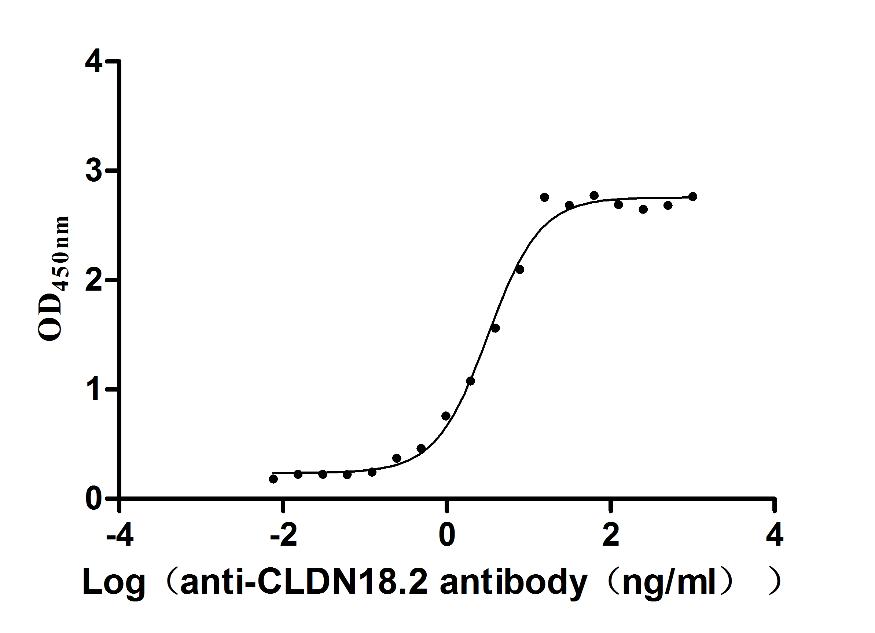
-AC1.jpg)
